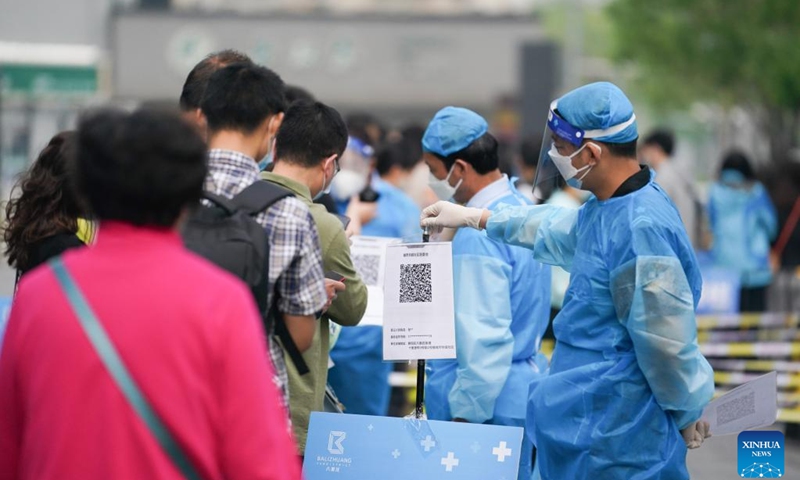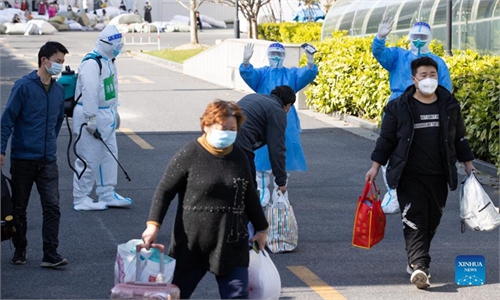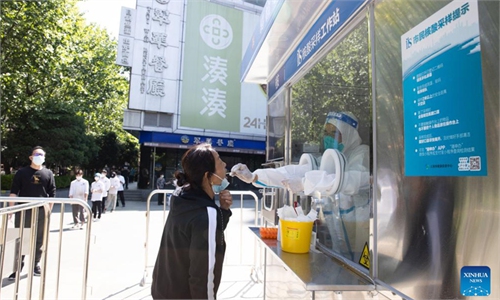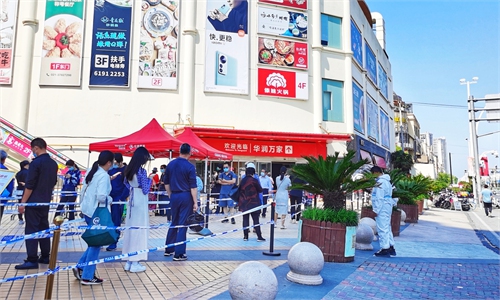China should invest more resources on COVID-19 prevention to avoid treatment pressure: health chief

People queue up to register for nucleic acid test at a testing site in Chaoyang District, Beijing, capital of China, April 25, 2022. Starting from Monday, people who live and work in the Chaoyang District have to take nucleic acid test every two days till April 29 to curb the recent resurgence of COVID-19.Photo: Xinhua
China's health chief pledged to invest more effort and resources on COVID-19 prevention measures such as nucleic acid testing and quarantine to avoid the huge pressure of treatment, especially for vulnerable groups.Ma Xiaowei, director of the National Health Commission (NHC), also revealed that China plans to build permanent facilities and more COVID-19 test sites to enhance the country's ability to prevent and control the coronavirus at the early stage of infection.
Ma unveiled the emphasis and blueprint to curb the virus in the long run in an article published in the Communist Party of China Central Committee's flagship magazine Qiushi Journal on Monday.
He noted that "if China didn't put efforts and resources into preventive measures, the country would face a large number of infections, huge pressure of treatment and risks to the lives of vulnerable people, including patients with underlying conditions, the elderly, children and pregnant women. The development of the economy and society would also be seriously affected. This is something the Chinese people and the Chinese government will never allow to happen."
Ma stressed the enhancement of the capacity of early detection and early quarantine, including setting up sampling sites where residents can take nucleic acid tests within a 15-minute walk in provincial capital cities or cities with over 10 million people.
"China should improve continuous COVID-19 monitoring practices, and prepare centralized quarantine facilities, designated hospitals and permanent makeshift hospitals for a quick response once the epidemic breaks out," Ma said.
Ma also emphasized the importance of a quicker response to cluster infections, especially in large enterprises, construction sites, farmers' markets, schools and nursing institutions, as well as consistent medical services for the public under epidemic control.
"All medical institutions should operate normally amid outbreaks. Suspensions should only be allowed with the permission of local health commissions and should not last more than two days," suggested Ma, adding that there should be designated hospitals for children, pregnant women and patients in need of dialysis or chemotherapy for cancer.
The current enhanced anti-epidemic measures have been proven able to achieve dynamic zero-COVID at the current stage, where prevention measures have been precise and scientific, and most transmission chains have been put under control within the incubation period, Ma pointed out.
"With consistent management, mass testing and screening and classified medical treatment, the epidemic-stricken Jilin in Northeast China has entered an end stage. The situation in Shanghai has been stabilized and is moving toward a positive direction," he said. "We have withstood the most severe test since the battle in Wuhan."
"If China were to lift its strict restrictions on epidemic prevention and control, it would experience a very strong shock in the initial short period of time, especially to the healthcare system," a senior expert from China's health commission told the Global Times on Monday on condition of anonymity.
The expert noted that China's focus on combating COVID-19 has been on prevention, as the country is not yet ready to relax the measures. "Before reopening, China should be well prepared and improve conditions in all areas to reduce losses and costs," the expert said.
In the article, Ma warned that when treating COVID-19 infections, China should prevent asymptomatic cases from overflooding medical resources and provide proper treatment for COVID-19 cases before they get serious.
On Thursday, the US reached what President Joe Biden called "a tragic milestone" of 1 million coronavirus deaths. In sharp contrast, a peer-reviewed study, published by the journal Nature Medicine, said that China risks a "tsunami" of coronavirus infections resulting in 1.55 million deaths if the government abandons its long-held zero-COVID policy and allows the highly infectious Omicron variant to spread unchecked.
Chinese health experts have reiterated that dynamic zero-COVID is the most suitable strategy for China to curb viral infections as it buys time for the country to ramp up efforts to prepare for a possible exit.



